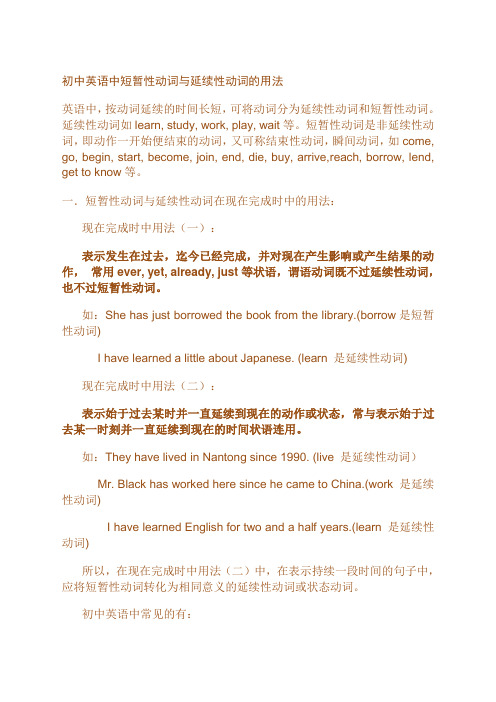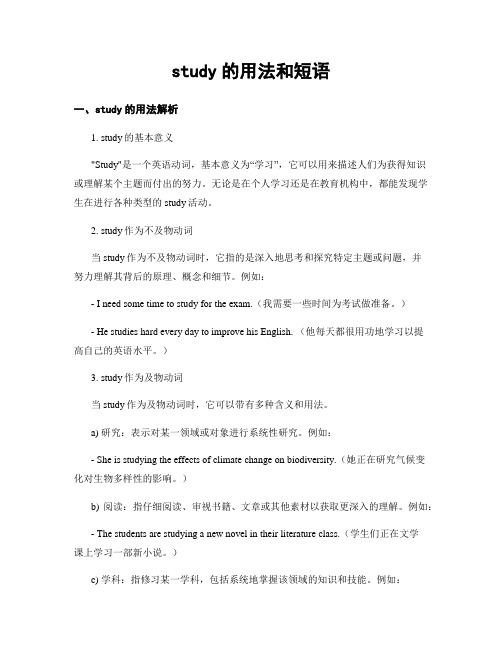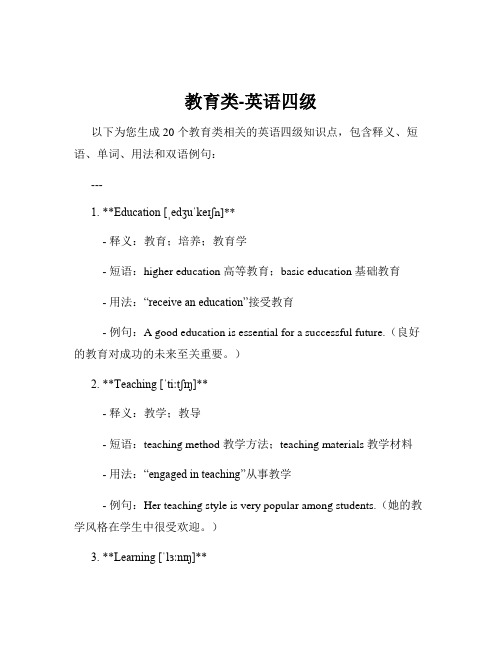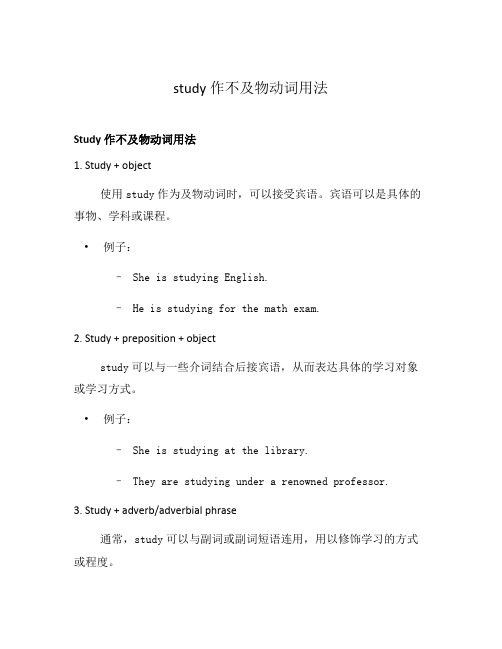study的用法和短语例句
一般过去时地用法及结构

一般过去时的用法及结构1.一般过去时的基本用法一般过去时表示过去某个时间发生的动作或存在的状态,也可表示过去经常或反复发生的动作。
常和表示过去的时间状语连用,如yesterday, last week, last night, in 2003, two days ago等。
【举例】 I got up at 6:30 yesterday. 我昨天6:30起床。
My father was very busy last week. 我父亲上周很忙。
2.一般过去时的基本结构⑴肯定句“主语+动词过去式+其他”或者“主语+was/were+其他”。
【举例】 I played tennis last weekend. 我上周末打网球了。
My school trip was great. 我的学校郊游棒极了。
⑵否定句“主语+didn’t+动词原形+其他”或“主语+wasn’t/weren’t+其他”。
【举例】 The girl didn’t play computer games yesterday afternoon.这个女孩昨天下午没玩电子游戏。
Old Henry wasn’t happy last Friday. 上星期五老亨利不高兴。
⑶一般疑问句“Did+主语+动词原形+其他?”肯定回答为“Yes,主语+did”,否定回答为“No,主语+didn’t”或者“Was/Were+主语+其他?”肯定回答为“Yes,主语+was/were”,否定回答为“No,主语+wasn’t/weren’t”。
【举例】— Did you go to the beach? 你们去海滩了吗?— Yes, we did./No, we didn’t. 是的,我们去了。
/不,我们没有。
— Was your weekend OK? 你的周末过得还行吧?— Yes, it was./No, it wasn’t. 是的,还行。
/不,不行。
短暂性动词与延续性动词的用法

初中英语中短暂性动词与延续性动词的用法英语中,按动词延续的时间长短,可将动词分为延续性动词和短暂性动词。
延续性动词如learn, study, work, play, wait等。
短暂性动词是非延续性动词,即动作一开始便结束的动词,又可称结束性动词,瞬间动词,如come, go, begin, start, become, join, end, die, buy, arrive,reach, borrow, lend, get to know等。
一.短暂性动词与延续性动词在现在完成时中的用法:现在完成时中用法(一):表示发生在过去,迄今已经完成,并对现在产生影响或产生结果的动作,常用ever, yet, already, just等状语,谓语动词既不过延续性动词,也不过短暂性动词。
如:She has just borrowed the book from the library.(borrow是短暂性动词)I have learned a little about Japanese. (learn 是延续性动词)现在完成时中用法(二):表示始于过去某时并一直延续到现在的动作或状态,常与表示始于过去某一时刻并一直延续到现在的时间状语连用。
如:They have lived in Nantong since 1990. (live 是延续性动词)Mr. Black has worked here since he came to China.(work 是延续性动词)I have learned English for two and a half years.(learn 是延续性动词)所以,在现在完成时中用法(二)中,在表示持续一段时间的句子中,应将短暂性动词转化为相同意义的延续性动词或状态动词。
初中英语中常见的有:例如:1. His grandfather has died for ten years.(F)His grandfather has been dead for ten years.(T) 2. My brother has joined the army for five years.(F)My brother has been in the army for five years.(T) My brother has been an armyman for ten years.(F)3. He has gone away for a week.(F) He has been away for a week.(T)4. The film has begun for fifteen minutes.(F)The film has been on for fifteen minutes.(T)但是,短暂性动词的现在完成时的否定形式能够表示一种延续的状态,所以能够和表示一段的状语连用。
自学英语短语

自学英语短语自学用英语来说的话,有什么短语翻译?下面是店铺给大家整理的自学英语短语,供大家参阅!自学英语短语study on one's ownself-study自学的英语例句1. Paul is self-taught and became interested in photography just four years ago.保罗是自学的,他四年前才开始对摄影产生兴趣。
2. He studied these subjects on his own.这些课程他是自学的.3. You can study by yourself.你可以自学.4. He teaches himself English.他自学英语.5. Traveling with the bands was a broadening experience for the musicians, who were usually self - taught .和这些乐队一起旅行使那些平素全靠自学的乐师们开阔了眼界.6. I taught myself how to play the piano.我自学了弹钢琴。
7. She taught herself the techniques of narrative and dialogue.她自学了叙事和对话的技巧.8. After several years'self study he acquired a great deal of knowledge.经过几年的自学,他获得了不少知识.9. He was self - taught in mathematics and so matured slowly in that subject.他是自学数学的,因而在这门学科中成熟缓慢.10. He is a self - educated man. He didn't finish even elementary school.他是一个自学成材的人. 他连小学也未读完.11. He taught himself the alphabet of biology.他自学了生物学的基础知识.12. I taught myself the rudiments of printing.我自学了印刷的基本知识.13. Hitler's just a self - educated street agitator.希特勒无非是个自学出身的街头煽动家罢了.14. He's studying at home now; he has left school.现在他在家里自学, 他不上学了.15. He had taught himself advanced mathematics from textbooks.他通过教科书自学了高等数学.self-study的双语例句1. Individuals can enrol on self-study courses in the university's language institute.人们可以报名参加这所大学语言培训机构的自主学习课程。
study的用法和短语例句

study的用法和短语例句【篇一】study的用法大全study的用法1:study的基本意思是“学习”“研究”“攻读”“仔细察看”,指通过读书和思索倾注精神而获得知识或比较深入系统地学习或周密地研究。
强调注意的连续性和细致性。
study的用法2:study可用作不及物动词,也可用作及物动词。
用作及物动词时,接名词、代词或带疑问词的动词不定式或从句作宾语,有时还可接“反身代词+形容词”构成的复合宾语。
可用于被动结构。
study的用法3:study的基本意思是“学习”,表示抽象的行为,用作不可数名词; 表示具体的“学业”时,通常用复数形式; 表示对某一课题的“研究”,一般在其前加冠词并跟介词of连用, of后接研究的内容或对象,用作可数名词; 作“书房”解时,用作可数名词。
study的用法4:study也可表示绘画的“习作”“练习曲”,用作可数名词。
study的用法5:study还可表示“引人注意的或不同寻常的事物或景象”,常跟不定冠词a连用。
【篇二】study的常用短语用作动词 (v.)study for (v.+prep.)study out (v.+adv.)study under (v.+prep.)study up (v.+adv.)用作名词 (n.)in a brown study【篇三】study的用法例句1. Charles and I were closeted in his study for the briefing session.我和查尔斯在他的书房里闭门开简介会。
2. The study links the main living area to the kitchen.书房把主要的生活区与厨房连在一起。
3. 673 private golf clubs took part in a recent study.673家私人高尔夫俱乐部参与了最近的研究。
4. He entered Otago University to study arts and divinity.他进入奥特哥大学学习艺术和神学。
study的用法和短语

study的用法和短语一、study的用法解析1. study的基本意义"Study"是一个英语动词,基本意义为“学习”,它可以用来描述人们为获得知识或理解某个主题而付出的努力。
无论是在个人学习还是在教育机构中,都能发现学生在进行各种类型的study活动。
2. study作为不及物动词当study作为不及物动词时,它指的是深入地思考和探究特定主题或问题,并努力理解其背后的原理、概念和细节。
例如:- I need some time to study for the exam.(我需要一些时间为考试做准备。
)- He studies hard every day to improve his English. (他每天都很用功地学习以提高自己的英语水平。
)3. study作为及物动词当study作为及物动词时,它可以带有多种含义和用法。
a) 研究:表示对某一领域或对象进行系统性研究。
例如:- She is studying the effects of climate change on biodiversity.(她正在研究气候变化对生物多样性的影响。
)b) 阅读:指仔细阅读、审视书籍、文章或其他素材以获取更深入的理解。
例如:- The students are studying a new novel in their literature class.(学生们正在文学课上学习一部新小说。
)c) 学科:指修习某一学科,包括系统地掌握该领域的知识和技能。
例如:- I decided to study psychology because I'm fascinated by the human mind.(我决定学习心理学,因为我对人类思维非常着迷。
)4. study作为名词在名词形式下,study可以指代一个地方或空间,用于个体的独立、安静和专注的学习。
此外,它还可表示一项研究、报告或调查。
教育类-英语四级

教育类-英语四级以下为您生成 20 个教育类相关的英语四级知识点,包含释义、短语、单词、用法和双语例句:---1. **Education [ˌedʒuˈkeɪʃn]**- 释义:教育;培养;教育学- 短语:higher education 高等教育;basic education 基础教育- 用法:“receive an education”接受教育- 例句:A good education is essential for a successful future.(良好的教育对成功的未来至关重要。
)2. **Teaching [ˈtiːtʃɪŋ]**- 释义:教学;教导- 短语:teaching method 教学方法;teaching materials 教学材料 - 用法:“engaged in teaching”从事教学- 例句:Her teaching style is very popular among students.(她的教学风格在学生中很受欢迎。
)3. **Learning [ˈlɜːnɪŋ]**- 短语:lifelong learning 终身学习;distance learning 远程学习 - 用法:“keen on learning”热衷于学习- 例句:Learning a new language can be challenging but rewarding.(学习一门新语言可能具有挑战性,但也很有收获。
)4. **Knowledge [ˈnɒlɪdʒ]**- 释义:知识;学问;知晓- 短语:scientific knowledge 科学知识;practical knowledge 实践知识- 用法:“acquire knowledge”获取知识- 例句:A wide range of knowledge is necessary for this job.(这份工作需要广泛的知识。
人教版九年级英语上册Unit1单词及重点短语(附例句)

人教版九年级英语上册Unit 1单词及重点短语(附例句)【人教版九上Unit 1单词】textbook n.教科书;课本There are 14 units in the ninth grade English textbook. 九年级的英语课本有14个单元conversation n.交谈;谈话My mother had a telephone conversation with my English teacher. 我妈妈和我的英语老师进行了一次电话交谈。
aloud adv.大声地;出声地You should read English aloud in the morning. 你应该在早上大声朗读英语。
pronunciation n. 发音;读音His pronunciation is bad.他的发音不好。
sentence n.句子My sister is too young to speak out a complete sentence. 我妹妹太小了,还不能说出一个完整的句子。
patient adj.有耐心的n.病人Doctors always take care of every patient patiently. 医生总是耐心地照顾每个病人。
She is patient with everything.她对一切都很有耐心。
expression n.表达(方式);表示There was an expression of joy on her face when she heard the excitingnews.当她听到这个令人兴奋的消息时,脸上露出了喜悦的表情。
discover v.发现;发觉Scientists are working to discover a better way to fight air pollution. 科学家们正在努力寻找防治空气污染的更好方法。
study作不及物动词用法

study作不及物动词用法Study作不及物动词用法1. Study + object使用study作为及物动词时,可以接受宾语。
宾语可以是具体的事物、学科或课程。
•例子:–She is studying English.–He is studying for the math exam.2. Study + preposition + objectstudy可以与一些介词结合后接宾语,从而表达具体的学习对象或学习方式。
•例子:–She is studying at the library.–They are studying under a renowned professor.3. Study + adverb/adverbial phrase通常,study可以与副词或副词短语连用,用以修饰学习的方式或程度。
–She studied diligently for the exam.–He is studying hard to improve his skills.4. Study + up (Phrasal verb)当study与up连用时,表示复习、补充或加强对某一学科或主题的学习。
•例子:–I need to study up on history before the test.–He studied up and passed the certification exam. 5. Study + on (Phrasal verb)类似于”study up on”,当study与on连用时,表示集中学习某一特定主题或学科。
•例子:–She is currently studying on the topic of climate change.–They studied on the subject of psychology for their research project.6. Study + for在这种用法中,study表示为了准备某事而学习。
study的用法总结大全

study的用法总结大全想知道study的用法吗?今日我给大家带来了study的用法,希望能够关怀到大家,下面我就和大家共享,来欣赏一下吧。
study的用法总结大全study的意思n. 学习,商量,课题,书房,结论vi. 考虑,深思,默想,努力vt. 想出,具体地检查,背诵(台词等),为…费心思变形:过去式: studied; 如今分词:studying; 过去分词:studied;study用法study可以用作动词study的基本意思是“学习”“商量”“攻读”“仔细察看”,指通过读书和思索倾注精神而获得学问或比较深入系统地学习或周密地商量。
强调留意的连续性和细致性。
study可用作不及物动词,也可用作及物动词。
用作及物动词时,接名词、代词或带疑问词的动词不定式或从句作宾语,有时还可接“反身代词+形容词”构成的复合宾语。
可用于被动结构。
study的基本意思是“学习”,表示抽象的行为,用作不行数名词; 表示具体的“学业”时,通常用复数形式; 表示对某一课题的“商量”,一般在其前加冠词并跟介词of 连用, of后接商量的内容或对象,用作可数名词; 作“书房”解时,用作可数名词。
study用作动词的用法例句Scientists are studying the photographs of Mars for signs of life.科学家们正在商量火星的照片,寻求生命的迹象。
I like to study in the library.我宠爱在图书馆学习。
She has been awarded a scholarship to study at Harvard.她获得了去哈佛大学读书的奖学金。
study可以用作名词study的基本意思是“学习”,表示抽象的行为,用作不行数名词; 表示具体的“学业”时,通常用复数形式; 表示对某一课题的“商量”,一般在其前加冠词并跟介词of 连用, of后接商量的内容或对象,用作可数名词; 作“书房”解时,用作可数名词。
study的用法总结大全3篇

study的用法总结大全study的用法总结大全精选3篇(一)study作为动词,其常见用法总结如下:1. study + 主题/课程/学科:表示学习某个主题、课程或学科。
- I'm studying math this semester.- She is studying physics at university.2. study + 人/组织/团体/人群:表示研究或调查某个人、组织、团体或人群的行为、习惯等。
- The researchers studied the effects of climate change on polar bears.- They have been studying the behavior of teenagers in urban areas.3. study + 方式/方法:表示研究或考察某个方式或方法的可行性、效果等。
- The scientists are studying different ways to reduce carbon emissions.- The company studied various marketing strategies before launching their new product.4. study + 条件/现象:表示研究或观察某种条件或现象的原因、机制等。
- The study aims to examine the relationship between sleep and memory.- They conducted a study on the impact of pollution on human health.5. study + 地点/场所:表示在某个地点或场所学习、研究或调查。
- He went to the library to study for his exam.- We visited the archaeological site to study ancient artifacts.6. study + 书籍/文献/资料:表示阅读、研究或分析某些书籍、文献或资料。
中英双语对照版纯英文版

中英双语对照版纯英文版好的,以下是 20 个中英双语对照的单词示例,包括英语释义、短语、用法和双语例句:---1. **Love**- 释义:爱;热爱;喜欢- 短语:fall in love 坠入爱河;love at first sight 一见钟情- 用法:及物动词,可接名词、代词或动词 -ing 形式作宾语- 例句:- I love you. (我爱你。
)- She loves reading books. (她喜欢读书。
)2. **Happy**- 释义:高兴的;幸福的;满意的- 短语:be happy with 对...感到满意;happy birthday 生日快乐 - 用法:形容词,在句中作定语、表语或宾语补足语- 例句:- They are very happy. (他们非常高兴。
)- I'm happy to help you. (我很乐意帮助你。
)3. **Beautiful**- 释义:美丽的;出色的;迷人的- 短语:a beautiful view 美丽的景色;beautiful music 优美的音乐 - 用法:形容词,常用来修饰名词- 例句:- She is a beautiful girl. (她是个美丽的女孩。
)- The flower is very beautiful. (这朵花非常漂亮。
)4. **Strong**- 释义:强壮的;坚强的;强烈的- 短语:strong wind 强风;strong point 优点- 用法:形容词,可作定语或表语- 例句:- He is a strong man. (他是个强壮的男人。
)- Her will is very strong. (她的意志非常坚强。
)5. **Kind**- 释义:善良的;友好的;种类- 短语:a kind person 善良的人;all kinds of 各种各样的- 用法:形容词,常用来描述人的品质;作名词时表示“种类”- 例句:- She is kind to everyone. (她对每个人都很友好。
八上英语每单元语法短语归纳

八年级上册英语语法短语归纳第一单元一、时态与语态本单元主要涉及的时态是一般现在时,用于描述经常性或习惯性的动作、状态或事实。
例句:I usually go to school by bike.(我通常骑自行车上学。
)She likes reading books in her free time.(她喜欢在空闲时间读书。
)二、重点短语be good at 擅长于用法:用于描述某人在某方面擅长。
例句:He is good at playing basketball.(他擅长打篮球。
)how often 多久一次用法:用于询问某事的频率。
例句:How often do you go to the movies?(你多久去看一次电影?)be interested in 对……感兴趣用法:描述某人对某事的兴趣。
例句:I am interested in learning English.(我对学习英语感兴趣。
)it's + adj. + for sb. to do sth. 对某人来说做某事是……的用法:用于描述某人对做某事的感受或看法。
例句:It's important for us to learn a foreign language.(对我们来说,学习一门外语是重要的。
)help with 帮助做某事用法:用于描述帮助某人做某事。
例句:Can you help me with my homework?(你能帮我做作业吗?)三、语法点一般现在时的构成:动词原形(主语为第一人称、第二人称及复数形式)动词第三人称单数形式(主语为第三人称单数)第三人称单数形式的变化规则:一般情况下在动词后加-s。
例句:He speaks English well.(他英语说得很好。
)以s, x, ch, sh, o结尾的动词,在词尾加-es。
例句:She watches TV every night.(她每晚看电视。
延续性动词与非延续性动词总结(含练习)

延续性动词与非延续性动词动词按其动作发生的方式、发生过程的长短可分为延续性动词与非延续性动词。
一.延续性动词表示能够延续的动作,如:study, learn, work, stand, lie, know, walk, keep, have, wait, watch, sing, read, sleep, live, stay等。
延续性动词可以与表示时间段的状语连用。
延续性动词的用法很广,常见于现在完成时中的句子中,且常与for,how,long,since等引导的表示一段时间的状语或状语从句连用。
表示时间段的短语有:1.for+一段时间, eg: for 2 years; for a long time等从句,since he came here;3.since+时间点名词+ago, eg:since last year, since 5 days ago;4. how long;二.非延续性动词也称终止性动词、瞬间动词或点动词,表示不能延续的动作,这种动作发生后立即结束。
如:open, die, close, begin, finish, come, go, move, borrow, lend, buy, move, happen, marry, arrive/reach, post, fall, break, lose, give,常见的这类动词有:go, come, leave, arrive, lose, land, catch, join, kill, find 等。
例如:1. He has joined the club for a long time. ( 错)2. He has been a member of the club for a long time. ( 对)3. His grandfather has died for over 30 years. ( 错)4. His grandfather has been dead for over 30 years. ( 对)【注意】之所以将这些动词称为瞬间动词,是因为这些动词在眨眼之间发生并终结。
study的用法总结大全

study的用法总结大全1. study作名词时,表示“研究;学习;书房”,常用短语有:- carry out a study 进行研究- conduct a study 开展研究- case study 案例研究- field study 实地研究- scientific study 科学研究- study abroad 出国留学- study group 学习小组- study session 学习会议2. study作动词时,表示“学习;研究;仔细观察”,常用短语有:- study hard 艰苦学习- study for an exam 为考试而学习- study a subject 学习一门学科- study a language 学习一门语言- study the effects/effects of 研究影响/影响因素- study the behavior of 研究行为- study the market 研究市场趋势- study the data 分析数据3. study作动词时,还可以表示“审视;彻底了解”,常用短语有:- study a map 查看地图- study a problem 仔细研究问题- study a text 仔细阅读文本- study someone's face 仔细观察某人的脸- study a painting 深入研究一幅画4. study还可以表示“设计;计划”,常用短语有:- study a plan 设计计划- study a proposal 研究提案- study a project 计划项目- study a schedule 制定时间表5. study还可以作形容词,表示“专业的;用于学习的”,常用短语有:- study material 学习资料- study skills 学习技巧- study guide 学习指南- study habits 学习习惯总之,study作名词时表示研究或学习的过程或结果;作动词时表示进行学习或研究的行为;作形容词时表示与学习相关的。
study的用法和短语例句翻译及阅读

study的用法和短语例句翻译及阅读study有研究;学习;读书;仔细观察;努力等意思,那么你知道study 的用法吗?下面跟着店铺一起来学习study的用法和短语例句吧,希望对大家的学习有所帮助!study的用法study的用法1:study的基本意思是“学习”“研究”“攻读”“仔细察看”,指通过读书和思索倾注精神而获得知识或比较深入系统地学习或周密地研究。
强调注意的连续性和细致性。
study的用法2:study可用作不及物动词,也可用作及物动词。
用作及物动词时,接名词、代词或带疑问词的动词不定式或从句作宾语,有时还可接“反身代词+形容词”构成的复合宾语。
可用于被动结构。
study的用法3:study的基本意思是“学习”,表示抽象的行为,用作不可数名词; 表示具体的“学业”时,通常用复数形式; 表示对某一课题的“研究”,一般在其前加冠词并跟介词of连用, of后接研究的内容或对象,用作可数名词; 作“书房”解时,用作可数名词。
study的用法4:study也可表示绘画的“习作”“练习曲”,用作可数名词。
study的用法5:study还可表示“引人注意的或不同寻常的事物或景象”,常跟不定冠词a连用。
study的常用短语用作动词 (v.)study for (v.+prep.)study out (v.+adv.)study under (v.+prep.)study up (v.+adv.)用作名词 (n.)in a brown studystudy的用法例句1. Charles and I were closeted in his study for the briefingsession.我和查尔斯在他的书房里闭门开简介会。
2. The study links the main living area to the kitchen.书房把主要的生活区与厨房连在一起。
3. 673 private golf clubs took part in a recent study.673家私人高尔夫俱乐部参与了最近的研究。
Unit9固定短语具体用法讲义人教版八年级英语上册

2024人教版英语八年上册Unit9固定短语具体用法讲义一、这些短语的具体用法和例句:1. on Saturday afternoon:在周六下午I usually play football on Saturday afternoon.(我通常在周六下午踢足球。
)2. prepare for:为……做准备We need to prepare for the exam.(我们需要为考试做准备。
)3. go to the doctor:去看医生She has to go to the doctor because she is sick.(她因为生病了,所以必须去看医生。
)4. have the flu:患感冒I can't e to school because I have the flu.(我不能来学校因为我患感冒了。
)5. help my parents:帮助我的父母I often help my parents do the housework.(我经常帮助我的父母做家务。
)6. e to the party:来参加聚会Can you e to the party tomorrow?(你明天能来参加聚会吗?)7. another time:其他时间Maybe we can meet another time.(也许我们可以在其他时间见面。
)8. last fall:去年秋天I went to Beijing last fall.(去年秋天我去了北京。
)9. go to the party:去聚会Are you going to the party tonight?(你今晚要去聚会吗?)10. hang out:常去某处;泡在某处I like to hang out with my friends at the mall.(我喜欢和我的朋友们在商场泡着。
)11. the day after tomorrow:后天The meeting will be held the day after tomorrow.(会议将在后天举行。
非谓语总结知识点例句

非谓语总结知识点例句一、不定式1. 不定式的形式与构成不定式是由“to + 动词原形”构成的,例如:to go, to play, to study等。
2. 不定式的用法(1)作主语例句:To study English is important for us.中文:学习英语对我们很重要。
(2)作宾语例句:I want to go to the park.中文:我想去公园。
(3)作表语例句:His dream is to become a doctor.中文:他的梦想是成为一名医生。
(4)作定语例句:There is a book to read on the table.中文:桌子上有一本书可读。
3. 不定式的特殊用法(1)不定式短语作目的状语例句:I went to the store to buy some food.中文:我去商店买些食物。
(2)不定式短语作宾语补足语例句:She wanted me to help her with the homework.中文:她希望我帮她做作业。
(3)不定式短语作原因状语例句:He came early to catch the first bus.中文:他早点来是为了赶第一班车。
二、动名词1. 动名词的形式与构成动名词是由动词加上-ing构成的,例如:going, playing, studying等。
2. 动名词的用法(1)作主语例句:Studying hard is necessary for passing the exam.中文:努力学习对通过考试是必要的。
(2)作宾语例句:I enjoy singing in the shower.中文:我喜欢在淋浴时唱歌。
(3)作定语例句:I have a lot of work to do.中文:我有很多工作要做。
3. 动名词的特殊用法(1)动名词短语作主语例句:Swimming is good for your health.中文:游泳对你的健康有好处。
并由此归纳总结了不同学术写作短语和句型的用法和例句

并由此归纳总结了不同学术写作短语和句型的用法和例句如下:1. 引出主题:- In this paper, we aim to investigate/analyze/explore...- The purpose of this study is to examine/study/review...- This research focuses on the topic of...2. 描述研究方法:- A quantitative approach was employed in this study.- A qualitative methodology was used for data collection.- The research design involved a cross-sectional survey.3. 数据分析:- The results were analyzed using statistical software (e.g. SPSS).- Descriptive statistics were calculated to summarize the data.- Inferential statistics were performed to test the hypotheses.4. 结果呈现:- The findings revealed that...- The results indicated that...- Our analysis showed that...5. 讨论与解释:- These findings are consistent with previous research.- The results suggest that...- There are several possible explanations for these findings.6. 结论:- In conclusion, our study highlights the importance of...- Overall, our findings support the hypothesis that...- Based on the evidence presented, it can be concluded that...7. 限制与建议:- One limitation of this study is that...- Future research could address this limitation by...-It is recommended that further investigations be conducted to validate these findings.8. 引用文献:- Previous studies have shown that... (Smith, 2010)- According to Jones (2015),...- Several authors have argued that... (e.g. Johnson & Smith, 2012; Brown, 2018)9. 提出假设:- We hypothesize that there is a positive correlation between X and Y.- It is proposed that X may contribute to the development of Y.- A possible explanation for this relationship is that...10. 比较与对比:- Compared to previous studies, our sample size was larger/smaller.- In contrast to Smith's findings, our results showed...。
- 1、下载文档前请自行甄别文档内容的完整性,平台不提供额外的编辑、内容补充、找答案等附加服务。
- 2、"仅部分预览"的文档,不可在线预览部分如存在完整性等问题,可反馈申请退款(可完整预览的文档不适用该条件!)。
- 3、如文档侵犯您的权益,请联系客服反馈,我们会尽快为您处理(人工客服工作时间:9:00-18:30)。
study的用法和短语例句
【篇一】study的用法大全
study的用法1:study的基本意思是“学习”“研究”“攻
读”“仔细察看”,指通过读书和思索倾注精神而获得知识或比较深入系统地学习或周密地研究。
强调注意的连续性和细致性。
study的用法2:study可用作不及物动词,也可用作及物动词。
用作及物动词时,接名词、代词或带疑问词的动词不定式或从句作宾语,有时还可接“反身代词+形容词”构成的复合宾语。
可用于被动结构。
study的用法3:study的基本意思是“学习”,表示抽象的行为,用作不可数名词; 表示具体的“学业”时,通常用复数形式; 表示对某一课题的“研究”,一般在其前加冠词并跟介词of连用, of后接研究的内容或对象,用作可数名词; 作“书房”解时,用作可数名词。
study的用法4:study也可表示绘画的“习作”“练习曲”,用作可数名词。
study的用法5:study还可表示“引人注意的或不同寻常的事物或景象”,常跟不定冠词a连用。
【篇二】study的常用短语
用作动词 (v.)
study for (v.+prep.)
study out (v.+adv.)
study under (v.+prep.)
study up (v.+adv.)
用作名词 (n.)
in a brown study
【篇三】study的用法例句
1. Charles and I were closeted in his study for the briefing session.
我和查尔斯在他的书房里闭门开简介会。
2. The study links the main living area to the kitchen.
书房把主要的生活区与厨房连在一起。
3. 673 private golf clubs took part in a recent study.
673家私人高尔夫俱乐部参与了最近的研究。
4. He entered Otago University to study arts and divinity.
他进入奥特哥大学学习艺术和神学。
5. I invite every citizen to carefully study the document.
我请每位市民都仔细研读该文件。
6. A new study proved conclusively that smokers die younger than non-smokers.
一项新的研究确证了吸烟者比不吸烟者死得早。
7. He went on to study music, specialising in the clarinet.
他继续学习音乐,主攻单簧管。
8. Prospective buyers should study the small ads in the daily newspaper.
打算购物的人应该研究研究日报上的小广告。
9. The research should prove invaluable in the study of linguistics.
该调查研究在语言学研究领域的重要性应该会得到证实。
10. Trendy teachers are denying children the opportunity to study classic texts.
赶时髦的教师正在剥夺孩子学习经典课本的机会。
11. The study also demonstrated a direct link between obesity and mortality.
该研究还表明了肥胖症和死亡率之间存有直接的联系。
12. He initiated her into the study of other cultures.
他将她领进了研究其他文化的大门。
13. Mark often took his books to Bess's house to study.
马克常常带着书本去贝丝家学习。
14. There'ssomething you could study without stirring from this room.
有些东西你不用离开这个房间也能够学习。
15. This study is described under "General Diseases of the Eye"
“普通眼科疾病”这个部分里对该项研究作了描述。
